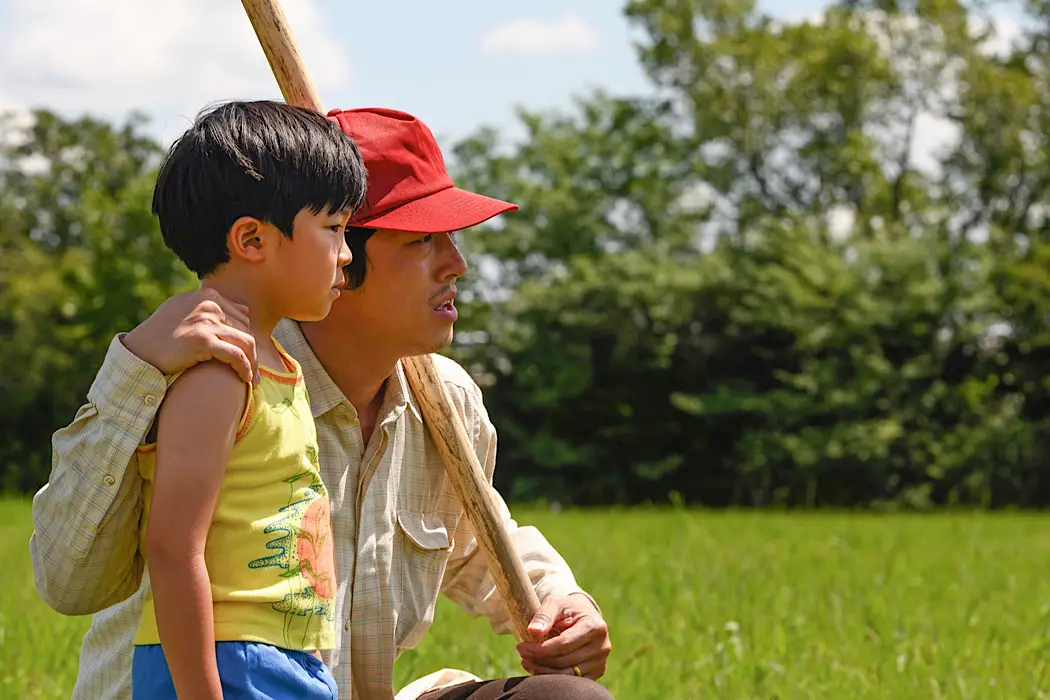Brad Pitt’s Plan B Entertainment Shortchanged MINARI

Film critic, Ithaca College and University of St Andrews graduate,…
When Youn Yuh-jung won Best Supporting Actress at the 93rd Academy Awards, she called out Brad Pitt. “Mr. Brad Pitt, finally, nice to meet you,” the legendary 73-year-old Korean actress said as she took the stage. “Where were you while we were filming in Tulsa? It’s very honored to meet you.”
The audience laughed, and the entertainment journalists in the press room and online were quick to jump on the comment. Journos backstage piled on questions about Pitt, whom Youn had just met for the first time at the ceremony when he presented her the Oscar. One reporter, from Extra, asked what he smelled like. “I didn’t smell him,” Youn said. “I’m not a dog.”
Pitt’s Plan B Entertainment produced Minari, a rural period piece (it’s set in 1983) about a Korean-American family trying to erect a farm on supposedly cursed land in Arkansas. Steven Yeun and Han Ye-ri lead the cast as Jacob and Monica Yi. Their children, David and Anne, are played by Alan Kim and Noel Kate Cho. When the stress of the farm, the move, the kids, and the day job proves too much for Jacob and Monica, they bring Monica’s mother, Soon-ja, in from Korea.
Grandma, played by Youn, isn’t anything like the kids imagined: She swears profusely, watches wrestling, plays cards, can’t cook, and accuses David of having a “broken ding-dong.” It’s great. And while Minari, especially Yeun and the film’s writer-director, Lee Isaac Chung, have been racking up award nominations, it’s Youn who’s been winning the most consistently. Along with dozens of critics’ awards, she won a SAG award, a BAFTA, an Independent Spirit Award, and an Oscar for her performance.
Production On Minari
Youn and Han are major stars in South Korea, where Youn’s been working in television and film for five decades and has accrued dozens of Korean film awards and nominations. (Some American outlets call her the “Korean Meryl Streep,” though since she’s two years older than her and started her career eight years sooner, it would be more accurate to call Streep the “American Youn Yuh-jung.”)
Despite the small cast and scaled-down story, Minari is an ambitious project. Not only did production have to fly two of its main stars to the United States from Korea, but one of the main characters is a kid, which means he can’t be on set for more than six hours at a time — plus, he’s in nearly every scene. Minari also had a 25-day shoot outside Tulsa, Oklahoma, at the foot of the Ozarks, where there’s not the production infrastructure in place that you would find in Georgia or New Mexico. The project was shot on location, so the trailer home had to be cobbled together from several other mobile homes.

Production took place in the summer, which meant that the trailer became unbearably hot. An active A/C unit, after all, would ruin the sound. “Particularly with the exterior work, we shot it in June-July of 2019 in peak sun with temperatures in the ’90s every day and shooting for 14 hours a day,” cinematographer Lachlan Milne told Awards Daily.
The costume department couldn’t afford to make doubles of the wardrobe. The production designer, Yong Ok Lee, told SHOOT online that she haggled with Arkansas locals and visited flea markets and yard sales to find the right props and set dressings. The costumes, the props, the minari itself — everything had to be found, bought, or built on site. No studio shoots. The stresses of low-budget cinema were compounded by a few complicated sequences, namely the film’s climax, its sole set-piece, for which the crew had to build a barn and then burn it to the ground.
“I Didn’t Smell Him”
Indie studio A24, which produced Best Picture–winner Moonlight, among a multitude of other critically adored projects, helped back Minari financially and covered its U.S. distribution, though Plan B is the sole studio credited with funding production. Yeun executive-produced the project as well. But despite the involvement of two major American indie studios, Minari’s production was still running on a microbudget, even compared to most indies.
“I actually spent a lot of my own money on this movie, to try and pay for the staff that helped us and stuff,” Youn told Lee Eun-Jae on her Korean variety show, MMTG. “They need to pay me a little if the movie makes it big,” she joked, though there was a hint of sincerity in her tone. “I deserve it. I invested a lot on this movie, Minari.”
Come Oscars night, she wasn’t “shooting her shot” or “fangirling” over Pitt, as some American media have speculated. She was calling him out for underfunding her project. As for their off-mic conversation between the Oscars stage and the press room, Youn later said to Korean media, “I told him to provide more money to the movie.”
“I also told him to come to Korea,” she said. “He promised that he will. But I don’t really believe the words of Americans. Their vocabulary is so fancy. He said my performance was very respectable and whatnot, but I’m old. I don’t fall for those words.”

That isn’t to say Youn is dissatisfied with the production. In interviews, she spoke highly of Chung’s emotionally involved direction and nuanced script and has nothing but praise for her fellow cast members. She also animatedly tells interviewers about the time Chung spent getting to know Youn and molding the grandmother character with her. But just as often, Youn will talk about how she constantly felt like she had something to prove since she was a foreigner on an American set. Likewise, in interviews, Chung mostly focuses on the actors and how his own upbringing informed the story. But he will always mention the extremely low budget he was given and how stressed out everyone was with their 25-day schedule.
To be clear, the underfunding of Minari is hardly a controversy. Outside of a few Twitter threads, nobody is discussing it. It nevertheless remains a curious question — if Minari became such a critical darling and awards juggernaut and if its production would have benefitted from having more funds, why was the film given such a small budget?
Crunching The Numbers
Regarding Minari’s budget, THR places it under $10 million, though Vulture and Awards Daily have reported that it’s closer to $2 million. (For most film productions, it’s safe to assume that the actual budget is twice that — $2M for production, $2M for marketing. Possibly more marketing money for Minari, given its big Oscars push.)
Two million is tremendously low, even for a project of this scale, which shot in the middle of the woods with two prominent Korean actors who needed to have been flown into the country. While the final product doesn’t evidence any cut corners or blemishes resulting from underfunding, no filmmaker has ever complained about having too much money in their budget. Plus, the cast, who all received awards recognition for the film, wouldn’t have had to take pay cuts or work in such challenging conditions.
To compare, a project like Jean Renoir’s 1945 agrarian drama The Southerner, also a low-budget, modestly sized production about farmworkers with a grand set-piece reserved for the finale, had today’s equivalent of an $11 million production budget. Compared to similar titles from 2020, Kelly Reichardt’s First Cow also had a budget of around $2 million, and Chloé Zhao’s Best Picture-winning Nomadland had a $5 million budget. Smaller-scale awards films that have more ensemble casts like Ma Rainey’s Black Bottom have surprisingly larger budgets. Ma Rainey was made for over $20 million, as was The Father.
Chung, like Reichardt, is not an unproven talent. Before Minari, Chung directed three shorts and three features and co-directed one documentary. And though Chung’s vision clearly wasn’t compromised too heavily by the lack of funds, the low budget of his film owes to a more significant devaluation of Asian-American artists in the United States, the same problem Youn brought to the attention of Korean news outlets.
Conclusion: Comparing Budgets
Minari’s low budget is to some extent a Plan B problem. Pitt’s studio gave similarly sized budgets to The Last Black Man in San Francisco ($2M) and Moonlight ($4M). Dramas of similar scale with white people in front of and behind the camera, on the other hand, have tended to receive larger budgets, like Beautiful Boy ($20M) and By the Sea ($10M), the latter of which Pitt and then-wife Angelina Jolie filmed during their honeymoon.
This isn’t a “gotcha” or an attempt to stir controversy. In the past, Pitt’s studio has generously funding filmmakers of color. Plan B produced 12 Years a Slave ($20M), Selma ($20M), and Okja ($50M), directed by Steve McQueen, Ava DuVernay, and Bong Joon-ho, respectively, and each film starring Black, Asian-American, or East Asian actors. None could be construed as “underfunded” — though these three films also have over three studios each credited with producing.
This is not to insinuate that The Last Black Man in San Francisco, Moonlight, or Minari suffered artistically as a result of their comparatively lower budgets. Rather, this indicates a pattern is not just how Plan B Entertainment has funded its films in the past, but also how the American film machine financially backs movies about non-white characters, with nonwhite creative teams, and with stories directly inspired by and about non-white communities.
Minari was made for the kind of money that has historically been available to arthouse filmmakers of color in Hollywood. It is therefore symptomatic of the financial neglect these filmmakers have always been privy to. Hollywood at its core likes to pretend to be a progressive entity, but Minari proves that despite heaps of awards and buzzwords like “representation” and “diversity,” production companies are still not endorsing these voices with their wallets — at least, not to the extent they could or should.
Lee Isaac Chung’s next project is a high-profile one; it’s a live-action adaptation of the hit anime film Your Name. Hopefully, he’s provided ample funds.
What do you think of Minari’s production? Comment below with your thoughts.
Does content like this matter to you?
Become a Member and support film journalism. Unlock access to all of Film Inquiry`s great articles. Join a community of like-minded readers who are passionate about cinema - get access to our private members Network, give back to independent filmmakers, and more.
Film critic, Ithaca College and University of St Andrews graduate, head of the "Paddington 2" fan club.











